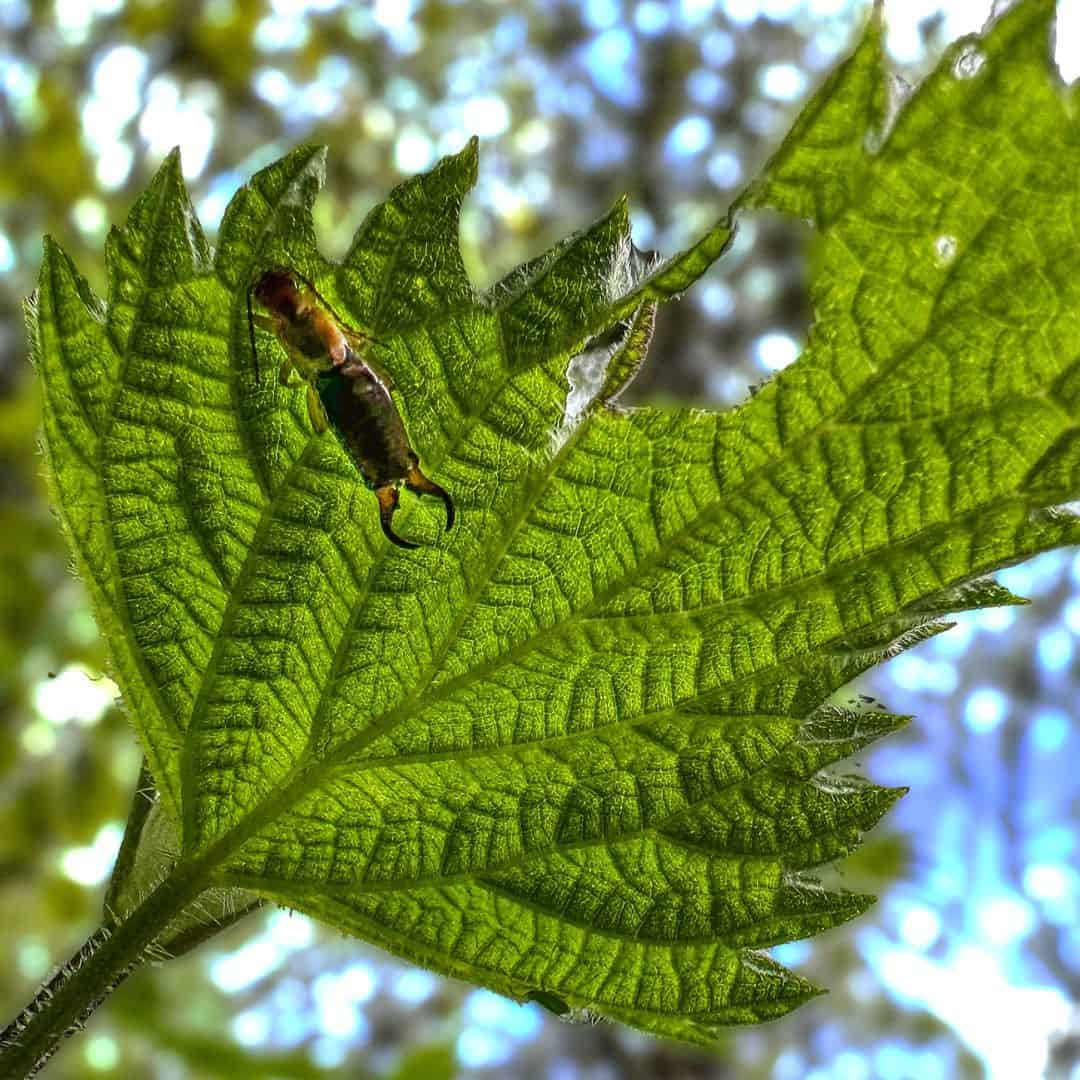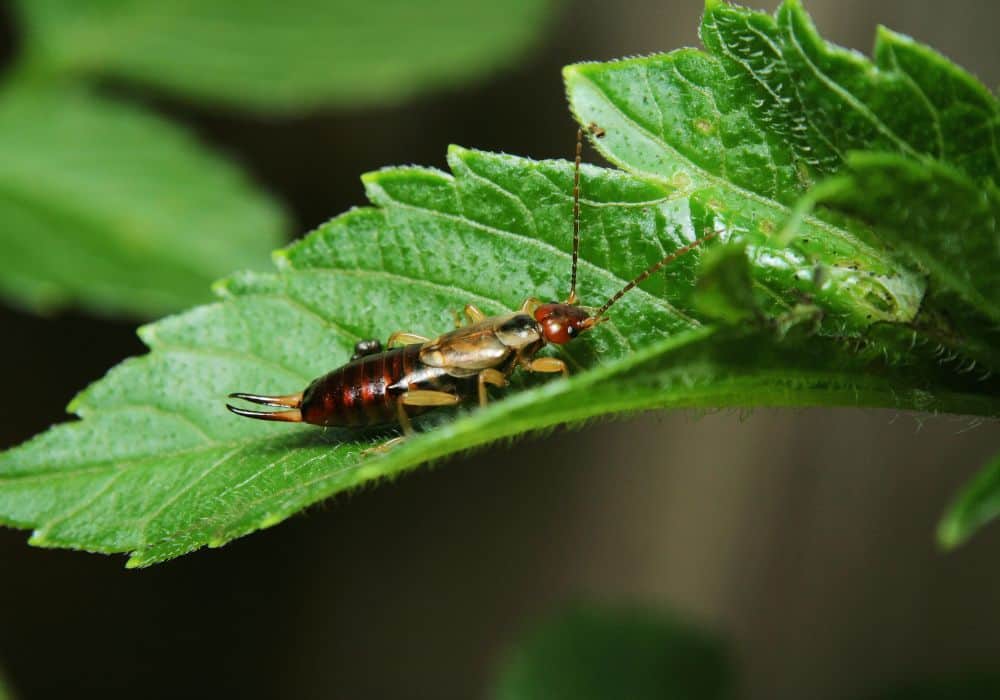Earwigs are tiny insects no one wants to see around or in their house, which is why many people look for ways to kick them out. While you can certainly use insecticides and kill them, there are better and more humane ways that will achieve the same effect.
Like many other bugs, they are repelled by certain scents, and in this article, we will talk exactly about that. Expect to learn what smells do earwigs hate, do they really like to wander into human ears, why do they come into our homes, and much more.
What are Earwigs?
Earwigs (Dermaptera) are an order of insects that can grow from 0.2 to 2 inches. Their dark brown body is flat and elongated, consisting of the head, thorax, and abdomen. They have antennae, called cerci, on their heads for smelling and touching.
Earwigs have three pairs of legs and one pair of wings, which are rarely used.
They also possess a pair of pincers that protrude from their abdomen, which they use for catching prey and defense. Because of these pincers, earwigs are also called pincher bugs. Some of their natural predators are tachinid flies, toads, birds, and spiders.
Are Earwigs fond of Human ears?
Unless by some miracle you grew up in Antarctica, the only continent where these small animals are not found, you must have heard stories in your childhood about how earwigs can enter the ear and pierce the eardrum with their pincers or, even worse, probe into brain.
The truth is that earwigs can pinch with their highly developed and hardened appendages, but the effect on humans is hardly noticeable. Also, sometimes they might stray into someone’s ear, but that is just some bad luck and not a proclivity of theirs.
All this is to say that the stories you heard were just that – stories.
Why are they called earwigs, then, you might ask? The word is a combination of the Old English words ear and wicag, which means insect and refers to the shape of the insect’s fan-shaped, membranous rear wings, which, when spread, resemble human ears.
6 Scents That Eawings Hate
So let’s take a look at what smells earwigs hate!
1. Basil

Basil is one of the most popular spices used all around the world.
However, what many do not know is that it is also one of the best repellents not only when it comes to earwigs but also other annoying little pests such as mosquitoes and ants, which is why you should surround yourself with it on window sills, balconies, and terraces.
2. Woodworm
Wormwood is a plant that is highly valued and known for its health and medicinal properties and is characterized by its strong taste and smell that earwigs hate. The smell comes courtesy of terpenes, aromatic compounds found in all plants and used to attract or repel animals by the plants.
Although it is most often grown outside, it is possible to cultivate woodworm indoors if you provide it with lots of sunlight.
3. Lavender
Lavender has a wonderful and relaxing scent that relieves stress and promotes healthy sleep. It is pleasant for most people but not insects because it contains the chemical compound linalool, a well-known insecticide.
The most famous is its use against moths, which explains why many people put dry lavender inside their wardrobe closets. Fortunately for us, earwigs feel the same about lavender as do moths.
4. Rosemary
Another well-known herb that is used worldwide and whose smell can not be tolerated by pincher bugs is rosemary.
It can be planted both outdoors and indoors, so feel free to place it near the doors or windows and know that these bugs will not come near it, especially when it is in the flowering phase.
It is also useful to know that the smell of rosemary will be more intense and thus more effective if we shake the plant.
In case you have found a place where earwigs are hiding in your house, you can put dry rosemary sprigs nearby to repel them.
5. Peppermint
Peppermint smells wonderful to us but not to these pests with a strong sense of smell. Having this plant in the house is not a bad idea because, in addition to driving away earwigs, you will always have a few sprigs that can be used to make tea on hand.
6. Citronella
Citronella is yet another powerful scent that keeps earwigs away. Similarly to other plants on this list, humans like its smell, and it can be grown indoors. The bonus of growing it is that you can use it to prepare some exotic dishes.
If you are highly fond of the citronella scent, you can utilize citronella candles to deal with earwigs.
How to Repel Earwigs Without Having to Grow Plants?

Image Credit: burntmoon_photography
Growing plants is a great way to make your home more aesthetically pleasing, and as we just saw, it helps us in this fight against earwigs.
But not everyone likes or wants to care for plants. And there are probably people who would not want their homes smelling like basil or rosemary all the time. So let’s take a look at how we can repel earwigs without having to cultivate plants.
1. Cinnamon
Cinnamon is another one of those smells that we humans simply adore but from which earwigs run away as fast as they can. You can buy it in the form of spice and sprinkle it around the problematic places or sticks you will place in those same spots.
2. Eucalyptus
Eucalyptus is another plant that works well against earwigs when its branches are hung around the house. For best results, hang them near cracks and crevices where these tiny insects hide.
3. Essential oils
Essential oils are natural and completely harmless repellents that effectively repel earwigs and other insects.
You can find the essential oils of all the plants mentioned in this article. The advantage essential oils have over the plants they are derived from is that they are much more concentrated, which is why their smell is much more powerful and, therefore, more effective in the fight against pincher bugs.
For this same reason, you should not use and sprinkle too much essential oil around your house. The best solution is to apply a few drops on cotton balls, which you will place in strategically important places.
An alternative to this is to add a few drops of Essential oil to a small bowl with water and leave it around the affected areas.
4. Spray
If you are a person who likes to act directly or is impatient, the best way is to utilize some kind of earwig-repelling liquid and spray it onto the spots where there is an infestation. To get that liquid, you can boil many of the plants we discussed so far.
5. Garlic, pepper, and dish soap mixture
There are a large number of organic preparations that can be used to repel pincher bugs, but few are as effective as garlic, pepper (use freshly ground or stronger types of pepper such as cayenne), and soapy water.
6. Vinegar
Unlike many of the scents we talked about, vinegar is not beloved by humans. But that is perfectly fine because earwigs have the same distaste for vinegar as us. You can mix white vinegar with water, pour the mixture into a spray bottle and spritz it over infested spots.
Why do Earwigs Visit our Homes?
Pincher bugs enter households most often due to a change in weather (from warmer to colder) or the need for food through external cracks and openings.
Because earwigs like more humid sheltered areas, they are usually found in areas with high condensation and moisture, such as basements or near water sources such as the bathroom or kitchen. Still, it is not uncommon to see earwig infestation in the bedroom or living room.
They look for dark and safe places, such as crevices and holes in these locations, to hide or lay eggs.
Although they are nocturnal animals, earwigs are attracted to light, so in the summer months, they can be a nuisance on terraces and porches.
How to Make Our Homes Less Inviting for Earwigs?
We can learn a thing or two about how to make our home less inviting for them and ensure they never come back.
We said that they usually enter our homes due to the arrival of colder weather. We can not influence the weather, but when we notice that the temperatures are decreasing, we can ensure that the doors and windows are not open except when they have to be.
Also, we can seal holes and cracks in, on, and around the house and thus reduce the chance of them invading the home.
Since they come inside searching for food, it is important not to leave any food container lid open during the night.
They are attracted to decaying matter, which is why you should clean and throw food scraps, dead leaves, and pet poop directly into the trash can and not leave them around the house or garden.
Lastly, do not leave light bulbs in front of the house or any other place lit during the night unless needed.
Conclusion
To summarize, earwigs hate the scent of basil, woodworm, lavender, rosemary, peppermint, citronella, cinnamon, and eucalyptus. You can plant some of these herbs in or around your house and ensure these tiny bugs never return.
You can also utilize essential oils made from these plants because they possess much more powerful scents.
Lastly, you can mix water with vinegar or pepper, garlic, and dish soap and spray it around problematic areas.
By the way, if you are reading this article because you are currently dealing with earwigs, please let us know in the comments was this article helpful. Also, feel free to ask any questions regarding this topic!
